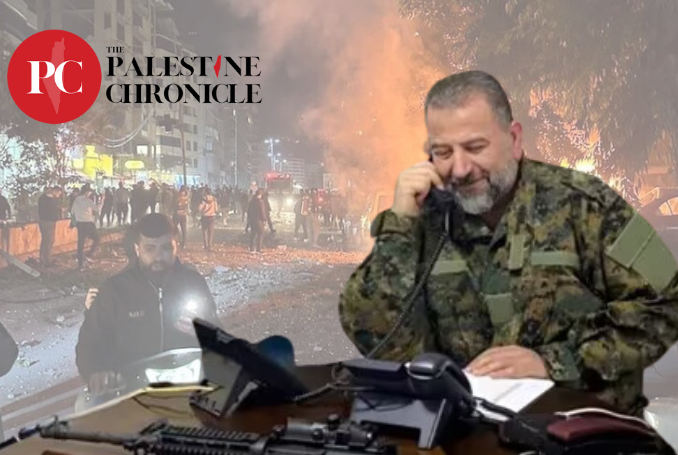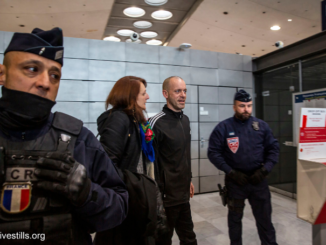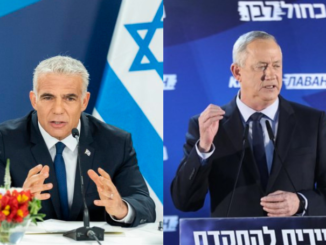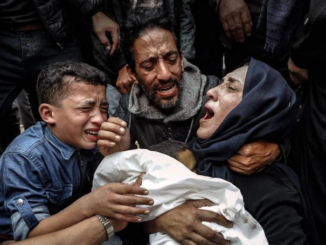
By Palestine Chronicle Editors
Saleh al-Arouri was the Deputy Head of the Palestinian Resistance Movement Hamas, and the founder of Al-Qassam Brigades in the occupied West Bank.
He was assassinated with other top Qassam leaders in Lebanon by several missiles fired by an Israeli drone while in an office in West Beirut on Tuesday, January 2.
In a statement, Hamas confirmed the assassination of al-Arouri.
“This cowardly assassination attacks, which the Zionist occupation is carrying out against our leadership and the symbols of our Palestinian people, inside and outside Palestine, will not succeed in breaking our will and the steadfastness of our people,” a top member of Hamas’ political bureau, Izzat al-Rishq, said.
For their part, Israeli leaders, including right-wing Prime Minister Benjamin Netanyahu, rejoiced at the killing of Arouri.
What did he stand for?
Saleh al-Arouri was not an ordinary leader. To begin with, his political vision and formation were a direct outcome of his own struggle as a Palestinian fighting to end the Israeli occupation of his homeland.
He had spent a total of 15 years in an Israeli prison due to his involvement with the Resistance.
Al-Arouri was born in the town of Arara – thus his last name – near Ramallah, in 1966. His connection to the West Bank remained strong even after he left.
HAMAS: The deputy head of the movement’s political bureau, Saleh Al-Arouri was assassinated in an explosion in Beirut. pic.twitter.com/yosoYbU2lS
— The Palestine Chronicle (@PalestineChron) January 2, 2024
Israel has constantly accused him of being the brain behind the rising armed struggle phenomenon in the West Bank and has repeatedly threatened to kill him.
The Palestinian leader is credited politically for being one of the main advocates of Wihdat Al-Sahat, or unity of the squares, a resistance strategy that allowed Palestinians, Lebanese, and other Arab Resistance groups to find a common denominator and collectively fight against Israel.
Al-Arouri is also known for having played an essential role in a prisoner exchange deal in 2011, which saw the release by Al-Qassam of a captured Israeli soldier, Gilad Shalit, in exchange for the release of hundreds of Palestinian prisoners.
Did Israel specifically call for his assassination?
Last August, the Israeli newspaper Yedioth Ahronoth reported that the Israeli government was considering the assassination of al-Arouri.
Arouri’s immediate response, reported by the Palestine Chronicle at the time, was appearing in his office in Gaza while wearing a military fatigue and talking on a phone with a smile on his face, and an automatic rifle on his desk.
The photo was meant to send a message back to Israel that neither al-Arouri nor Hamas were intimidated by the Israeli threats.
According to the Israeli newspaper, Israeli authorities believed that al-Arouri was the leader of a movement that attempted to ignite an uprising in the occupied West Bank.
Breaking News: Israel has assassinated Saleh Al Arouri, a founding commander of Hamas' military wing in Beirut, Lebanon. pic.twitter.com/U3O17geuiF
— MintPress News (@MintPressNews) January 2, 2024
Al Jazeera Arabic reported that the Israeli newspaper “linked Al-Arouri’s calls for direct confrontation with the Israeli army and settlers to the increase in Palestinian operations in the West Bank in recent months, including two operations in Huwwara and Al-Khalil (Hebron) a few days ago, in which three settlers were killed.”
Yedioth Ahronoth reported that retired Israeli general Eitan Dangot – who has served as the Military Secretary to three Ministers of Defense – had been calling for the assassination of Al-Arouri for years.
“He (al-Arouri) is, in my opinion, the most dangerous and important person in Hamas today,” Dangot told Yedioth Ahronoth.
According to the Israeli newspaper, the Israeli government held a three-hour meeting to address the issue of the recent Palestinian operations in the occupied West Bank. The final decision was to “strike terrorists and their instigators.”
In the meeting, Netanyahu made a direct reference and threats directed at al-Arouri.
“He (Arouri) knows very well why he and his friends are hiding. Hamas is well aware that we will fight by all means against their attempts to create terror against us in Judea and Samaria (the biblical name for the West Bank), in Gaza and elsewhere,” Al-Jazeera quoted Netanyahu as saying.
Why did Israel kill him?
Though the role played by al-Arouri in the October 7 military operation remains unclear, it is known that he has been active in helping manage the ongoing Resistance to Israel’s genocidal war in Gaza, the growing Resistance in the West Bank, and also the political negotiations regarding a possible prisoner swap.
?BREAKING: LEBANON MARCH CONDEMNING THE ASSASSINATION OF SALEH AL AROURI.
A march in the Beddawi camp in Lebanon condemning the assassination of Sheikh Saleh Al-Arouri. pic.twitter.com/BjEmoSzfgf
— Palestine Now (@PalestineNW) January 2, 2024
“Israel killed al-Arouri for several reasons,” Palestinian journalist and political analyst Ramzy Baroud said.
“First and foremost, it is a reflection of Israel’s failure to achieve any actual military success in Gaza. Israel killed al-Arouri to distract from its military defeat in the Strip.
“Second, to redeem the tattered image of its intelligence community, namely the Shin Bet and the Mossad, which have failed to anticipate the October 7 attacks. The Israeli brand, in terms of intelligence, has also been greatly tarnished by the war. Killing Arouri was a direct response to that.
“Third, al-Arouri was an important link between Hamas, Hezbollah, and Iran. Thus the choice of killing Arouri in particular was a message to all three parties that Israel is not intimidated and is ready to escalate.
“Fourth, al-Arouri was involved in ongoing, indirect negotiations regarding a prisoner swap. Hamas insists that all Palestinian detainees must be released in exchange for the release of Israeli prisoners. Hamas also wants a complete and final ceasefire. It is possible that Israel has also killed him to put more pressure on Palestinian negotiators.
“And finally, the political conflict between Netanyahu and his rivals in the war cabinet has reached unprecedented levels in recent days. Netanyahu killed Arouri as a desperate attempt to buy time.”
How will the Resistance respond to Arouri’s death?
Though Saleh al-Arouri was an important Palestinian Resistance leader, his assassination will unlikely change the current equation between Palestinian Resistance and Israel.
Palestinian Resistance uses a leadership paradigm that is based on the concept of durability, meaning that the killing of one or multiple leaders will not lead to the collapse of the leadership.
?BREAKING: MARCH IN RAMALLAH CONDEMNING THE ASSASSINATION OF SALEH AL AROURI.
Angry march in Ramallah; Condemning the assassination of Sheikh Saleh Al-Arouri, Deputy Head of the Political Bureau of Hamas. pic.twitter.com/amRodbL14k
— Palestine Now (@PalestineNW) January 2, 2024
Whoever will replace Arouri in this position is likely to continue with his legacy since Palestinian Resistance is guided by fixed principles, not necessarily by the charisma of a certain leader.
It is certain that the Resistance will respond, as they must have anticipated that such assassination would take place. In fact, Netanyahu had himself declared recently that he had given the greenlight to the Israeli intelligence, the Mossad, to assassinate any Palestinian suspected of involvement in the October 7 attacks.
The Resistance response, however, will keep in mind two separate issues: one, responding decisively to deprive Netanyahu of his supposed victory, and two, responding strategically as not to allow Netanyahu and Israel the opportunity to dictate the new rules of combat.
(The Palestine Chronicle)








We all know who really had him killed.